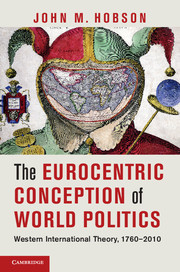Book contents
- Frontmatter
- Contents
- Figures
- Tables
- Acknowledgments
- 1 Introduction
- Part I 1760–1914
- 2 Eurocentric imperialism
- 3 Eurocentric anti-imperialism
- 4 Racist anti-imperialism
- 5 Racist imperialism
- Part II 1914–1945 The high tide of manifest Eurocentrism and the climax of scientific racism
- Part III 1945–1989 Subliminal Eurocentrism in international theory
- Part IV 1989–2010 Back to the future of manifest ‘Eurocentrism’ in mainstream international theory
- Part V Conclusion Mapping the promiscuous architecture of Eurocentrism in international theory, 1760–2010
- References
- Index
2 - Eurocentric imperialism
liberalism and Marxism, c. 1830–1914
Published online by Cambridge University Press: 05 June 2012
- Frontmatter
- Contents
- Figures
- Tables
- Acknowledgments
- 1 Introduction
- Part I 1760–1914
- 2 Eurocentric imperialism
- 3 Eurocentric anti-imperialism
- 4 Racist anti-imperialism
- 5 Racist imperialism
- Part II 1914–1945 The high tide of manifest Eurocentrism and the climax of scientific racism
- Part III 1945–1989 Subliminal Eurocentrism in international theory
- Part IV 1989–2010 Back to the future of manifest ‘Eurocentrism’ in mainstream international theory
- Part V Conclusion Mapping the promiscuous architecture of Eurocentrism in international theory, 1760–2010
- References
- Index
Summary
Introduction: paternalist-Eurocentric imperial conceptions of world politics
This chapter focuses on what I call ‘paternalist Eurocentric institutionalism’ and examines its embodiment in classical liberal/Marxist theory, focusing specifically on Cobden, Bright, Angell, Hobson and Marx. It is, of course, an axiom of IR that liberal internationalism and classical Marxism stand as the antitheses of imperialism. This received normative vision presupposes that imperialism and internationalism are situated within a binary relationship, in which imperialism is thought to stand for hierarchy, exploitation/inequality and the denial of sovereignty, while internationalism stands for anti-imperialism and sovereign equality/self-determination for all. But as I mentioned in Chapter 1, liberal internationalism and classical Marxism often constructed a formal hierarchical conception of gradated sovereignties.
As Figure 2.1 reveals, this normative formal hierarchical conception of gradated sovereignty rewards European states with hyper-sovereignty and the privilege of non-intervention on the grounds that they are deemed to be civilized. By contrast, because Eastern polities are deemed to be either ‘barbaric’ (the second world of Oriental despotisms), or ‘savage’ (the third world of anarchic societies residing within a domestic state of nature), so they are deemed to be unworthy of, and hence denied, sovereignty. Equally, the notion of a European imperial civilizing mission in the East rests on a shared conception of Eastern agency. While postcolonialists assume that such a discourse denies Eastern agency outright, it seems clear that Eastern societies are granted conditional agency within this variant. That is, they are capable of attaining rationality but that this can only be realized on condition that the ‘rationality requirement’ is satisfied – i.e., that the necessary rational institutions are delivered courtesy of the European civilizing mission. In this imaginary, the Western civilizing mission acts as a catalytic trigger, retracking non-European societies onto the progressive developmental path that had been laid down by the pioneering Europeans, with autonomous Eastern development proceeding thereafter into modern ‘civilization’.
- Type
- Chapter
- Information
- The Eurocentric Conception of World PoliticsWestern International Theory, 1760–2010, pp. 33 - 58Publisher: Cambridge University PressPrint publication year: 2012
- 1
- Cited by



